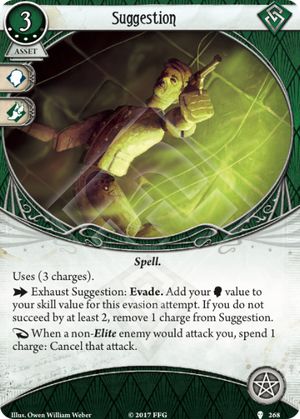
This card gets very broken with Sefina especially when combined with pickpocket lvl 2. One of the best combos we've found so far for it. Keeping elite enemies locked down whilst the team gets work done

This card gets very broken with Sefina especially when combined with pickpocket lvl 2. One of the best combos we've found so far for it. Keeping elite enemies locked down whilst the team gets work done

The lvl 0 of this card is barely usable. But this one is down right broken with Sefina if you combine it with suggestion. Sefina can easily get suggestion up to 9 to 10 without boosts and can keep elite enemies locked down whilst the rest of the team gets some work done. Jenny can probably use this as well with suggestion with a bit more work. very very strong combo

Re: Lola and this card, confirmed from Fantasy Flight rules enquiries: "...though Lola technically has access to Stick to the Plan, at the time its ability would be triggered, she has not yet chosen a starting role and therefore cannot trigger the ability on Stick to the Plan (rendering it rather useless for her). Matthew Newman."

A group, meta card. If your group is running any combination of Alyssa Graham, On the Hunt, Split the Angle and/or Scrying, this card is really, really good as you will always know exactly when to use it.
And at 1 XP, it is worth the buy in those situations.
Outside of it, I would probably only run 1 in a On the Hunt Guardian (aka almost everyone everyone who can run guardian). If nothing else, you pay 2 and 2 to save you an action on your next turn.

What do you do if you draw the elder sign chaos token and the only card in your discard pile is your weakness?
The character card says: "If this test is successful, return 1 card from your discard pile to your hand." It doesn't seem to be optional, yet, what do you do with a weakness in your hand? Is this effectively "drawing" the weakness, meaning you have to resolve it? Or does it just sit in your hand until you're over your hand-size limit and then you can discard it? Or do you just ignore the elder sign effect in this situation?